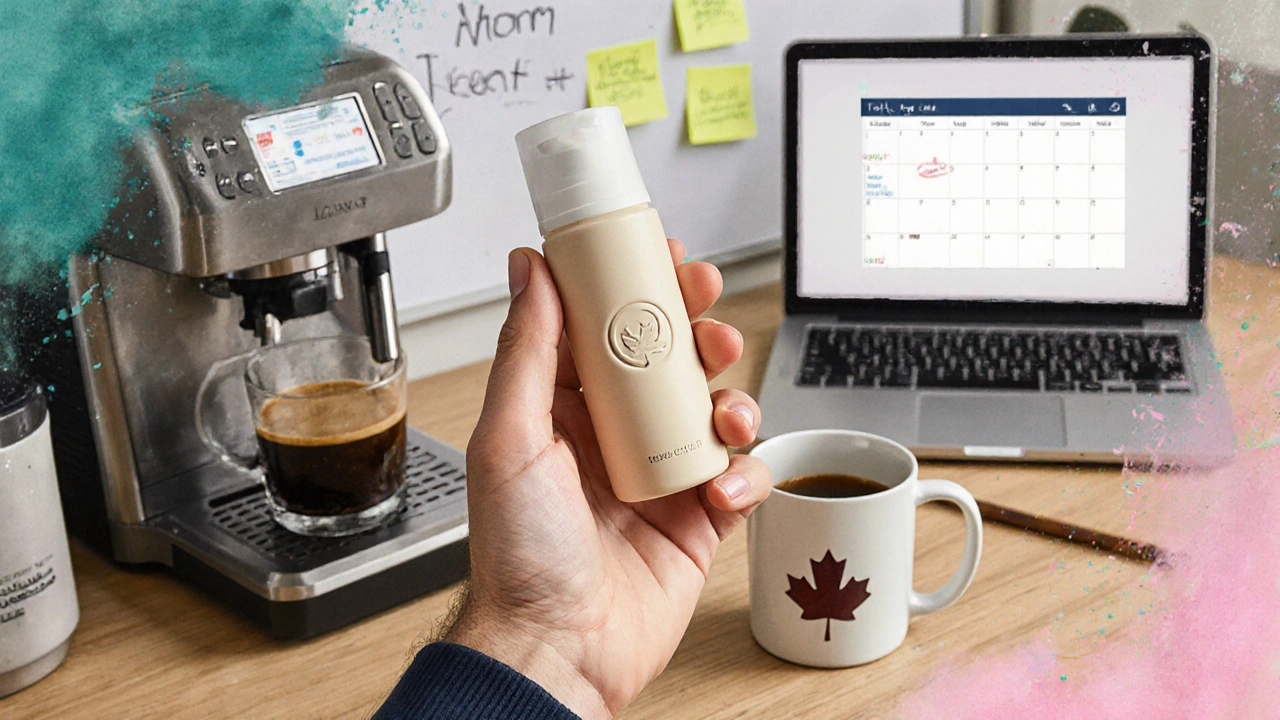Workplace Eczema Trigger Identifier
Select the triggers you experience at work to receive personalized tips:
Common Workplace Triggers
Your Personalized Tips
When you hear eczema is a chronic skin condition that causes itchy, inflamed patches and can flare up under stress or environmental triggers, you might think it’s something you deal with at home. But the reality is many people face flare‑ups while navigating meetings, deadlines, and office air‑conditioning. This guide shows how to keep your skin calm, stay productive, and work with your employer without drama.
Why Eczema Often Gets Worse at the Office
First, let’s break down the main culprits that turn a manageable skin condition into a daily headache:
- Dry air: Central heating or air‑conditioning can strip moisture from the skin barrier.
- Stress: Tight project timelines boost cortisol, which can ignite itching.
- Allergens: Office cleaning products, carpet dust, or even certain fabrics can act as irritants.
- Physical friction: Long hours at a desk mean rubbing against chair upholstery or wrist rests.
Knowing the triggers helps you target the right fixes before the rash spreads.
Step‑by‑Step Plan to Tame Eczema During Work Hours
- Talk to a dermatologist a skin specialist who can prescribe tailored treatments and skin‑care routines. Get a written note if you need workplace accommodations.
- Ask your employer the person or organization that hires you and sets workplace policies for a quick sit‑down about your needs-think flexible breaks, a humidifier, or a safer cleaning schedule.
- Set up an ergonomic desk area: use a breathable chair cushion, a soft mouse pad, and keep your wrists aligned to avoid friction.
- Moisturize before and after work. Choose a fragrance‑free, thick cream (e.g., ointments with ceramides) and apply it within three minutes of washing your hands.
- Stay hydrated all day. A water bottle at your elbow reminds you to sip regularly, which helps skin retain moisture.
- Manage stress with micro‑breaks: five‑minute breathing exercises, a quick walk, or a stretching routine can lower cortisol spikes.
- Control the office climate: ask for a portable humidifier or request that the HVAC system be set to a moderate humidity level (40‑60%).
- Identify and avoid specific allergens. If you suspect a cleaning product, request a hypo‑allergenic alternative from the facilities team.
These actions create a skin‑friendly shield without demanding major changes from the whole team.
Quick Reference: Common Triggers vs. Practical Fixes
| Trigger | Why It Hurts | Easy Fix |
|---|---|---|
| Dry air from HVAC | Dries out the skin barrier, increasing itch | Use a desk humidifier or place a water bowl near the vent |
| Stressful deadlines | Boosts cortisol, which can flare inflammation | 5‑minute mindfulness break; schedule tasks in bite‑size chunks |
| Fragrant cleaning sprays | Contains chemicals that irritate sensitive skin | Request fragrance‑free cleaning; keep a personal wipe handy |
| Rough chair fabric | Creates friction, leading to micro‑abrasions | Cover with a breathable cushion or a soft, hypo‑allergenic blanket |
| Hand washing too often | Strips natural oils, weakening the barrier | Use lukewarm water, mild soap, and moisturize immediately after |

Legal Rights and Workplace Policies
In the UK, the Equality Act 2010 protects people with chronic health conditions, including eczema, from discrimination. This means you can request reasonable adjustments-like a flexible dress code or altered work‑station setup-without fear of retaliation. If you encounter resistance, your company’s occupational health department the team that assesses workplace fitness and recommends accommodations can mediate the discussion and document the need for changes.
Having a written record of your doctor’s recommendation and any agreed‑upon adjustments helps both you and your manager stay on the same page. It also creates a paper trail if you ever need to involve HR or external advisors.
Everyday Skin‑Care Kit for the Office
Think of your desk drawer as a mini first‑aid station for flare‑ups. Here’s what to keep handy:
- Fragrance‑free ointment (e.g., a ceramide‑rich balm)
- Gentle, hypo‑allergenic hand soap
- Reusable wipes or a soft cloth for quick clean‑ups
- Discreet, breathable gloves for tasks that involve chemicals
- A small bottle of saline spray to soothe itchy eyes or nasal passages that can trigger skin irritation
Having these items visible reminds you to act fast before itching turns into a full‑blown flare.
When Things Still Go Wrong
If you notice that despite all adjustments your eczema persists, consider these next steps:
- Schedule a follow‑up with your dermatologist. You might need a stronger prescription, phototherapy, or a change in medication.
- Ask HR for a formal occupational health review. An independent assessor can suggest workplace changes you might have missed.
- Explore remote‑work options. Even a few days a week can lessen exposure to harsh office environments.
- Connect with support groups-online forums or local eczema charities often share real‑world hacks that you won’t find in medical literature.
Remember, managing eczema is a marathon, not a sprint. Small, consistent tweaks usually bring the biggest relief.
Key Takeaways
- Identify your personal triggers-dry air, stress, allergens, and friction are the usual suspects.
- Talk to a dermatologist early and keep a written note for workplace accommodations.
- Use a simple skin‑care routine: moisturize often, stay hydrated, and protect your skin from harsh fabrics.
- Leverage legal protections under the Equality Act and work with your employer’s occupational health team.
- Keep a compact office skin‑care kit and be ready to act at the first sign of itch.

Frequently Asked Questions
Can I request a seat near a window to get more natural light?
Yes. Natural light can improve mood and reduce stress‑related flare‑ups. Just make sure the window isn’t drafty, as sudden temperature changes can also irritate skin.
What type of moisturizer works best for eczema at work?
Look for fragrance‑free ointments with ceramides, occlusives like petrolatum, or hyaluronic acid. Apply within three minutes of hand‑washing for best absorption.
Do I have to disclose my eczema to my manager?
Disclosure is optional, but sharing a brief note from your dermatologist can help secure reasonable adjustments and protect your rights under the Equality Act.
How can I reduce stress‑induced flare‑ups during busy periods?
Incorporate short mindfulness breaks, use a timer for the Pomodoro technique, and keep a bottle of water handy. Even a 2‑minute deep‑breathing exercise can lower cortisol levels.
Is it okay to wear breathable fabrics like cotton on the job?
Absolutely. Cotton, bamboo, or moisture‑wicking blends reduce sweating and friction, which are common eczema triggers.


14 Responses
Ever notice how the office HVAC is basically a secret weapon for the big pharma agenda they don’t want us to see it’s drying out your skin so they can push pricey moisturizers onto you every time you file a complaint
First off, kudos for tackling a topic that can feel like walking through a minefield of itchy distractions at the office.
The best way to start is by turning the workplace into a skin‑friendly sanctuary, and that begins with a solid hydration plan.
Keep a decorative water bottle on your desk as a visual reminder that your skin thrives on internal moisture as much as on external lotions.
Invest in a small, whisper‑quiet humidifier; it’s like a personal cloud that gently replenishes the air without raising anyone’s eyebrows.
When the deadline monster rears its head, pause for a five‑minute breathing exercise; think of it as a mini‑vacation for your nervous system.
You’ll be amazed how reducing cortisol spikes can calm that relentless itch that otherwise hijacks your focus.
Next, audit your cleaning supplies – ask for fragrance‑free alternatives and keep a travel‑size wipe in your drawer for quick spot‑cleaning.
Your chair can be a silent aggressor, so a breathable cushion or a soft, hypo‑allergenic blanket can transform friction into comfort.
Remember the golden rule of hand hygiene: lukewarm water, mild soap, and an immediate slather of ceramide‑rich ointment within three minutes.
If you’re forced to wash hands more than five times a day, keep a pocket‑size moisturizer handy to seal the barrier each time.
Don’t underestimate the power of appropriate clothing; cotton or bamboo fabrics let your skin breathe, while synthetic blends can trap heat and sweat.
If possible, negotiate a flexible work‑from‑home day each week; even a few hours away from the office climate can give your skin a breather.
Document any accommodations you receive in writing; it creates a clear trail should you need to reference it later with HR.
Lastly, join an online eczema support community – sharing real‑world hacks can reveal hidden gems that textbooks never mention.
With these steps, you’ll not only tame the flare‑ups but also boost your overall productivity, proving that healthy skin and a thriving career can coexist.
I totally get how the office can feel like a skin‑irritatting obstacle course. It helped me start a little “moisturizer station” on my desk and it saved me from constant scratching. Just remember to keep the jar sealed so it doesn’t go stale.
The body is a micro‑cosm, a canvas where external forces paint their narratives upon us. When the air turns arid, it whispers an invitation to the epidermis to surrender its moisture. Yet we possess agency: a desk humidifier becomes a silent philosopher, questioning the status quo of corporate climate control. By aligning our environment with our physiological needs, we rewrite the story of discomfort into one of resilience. In this quiet rebellion, the skin becomes a testament to thoughtful adaptation.
Sure, because asking for a humidifier is such a radical act in the modern office. Maybe the CEO will notice your itchy elbow and declare a wellness initiative. Or you could just keep a bowl of water on your desk and call it “art”. Either way the friction from that chair fabric isn’t going to magically disappear. Good luck with the “reasonable adjustments”.
A gentle cushion and a fragrance‑free cleanser go a long way. Keep a small tube of ointment handy for quick relief. Consistency is the key to calmer skin.
While many preach “just moisturize more”, the real issue lies in the systemic oversight of workplace air quality. It is not enough to slather on creams; the ventilation system must be held accountable. Moreover, suggesting that stress alone triggers eczema oversimplifies a complex immunological response. Employers should conduct regular humidity audits rather than rely on individual coping strategies. Ignoring these facts perpetuates a negligent environment.
OMG can you believe they actually hide the humidifiers behind the “energy savings” plan? It’s like they want us to suffer so they can sell us overpriced skin‑care gadgets later! I’m telling you, the scented cleaning sprays are a covert weapon designed to keep us dependent on “special” lotions. Every time I walk past the supply closet I feel like I’m stepping into a chemical war zone. The drama never ends, but I’m still fighting the itch battle like a ninja in a cubicle.
From a dermatological compliance perspective, implementing a tiered humidity control protocol aligns with occupational health standards. Integrating ceramide‑enriched barrier repair agents into the employee wellness toolkit can mitigate transepidermal water loss (TEWL). Additionally, leveraging a risk‑based assessment matrix for allergen exposure enhances regulatory adherence. These interventions collectively reduce flare‑up incidents while supporting productivity metrics.
Isn’t it curious how the invisible particles in the air echo the unseen thoughts in our minds 🌫️? When we adjust the climate, we are essentially harmonizing the external with the internal. A simple humidifier becomes a symbol of balance, a reminder that care for the skin mirrors care for the psyche. Let’s not forget that mindfulness and moisture share a common thread – they both nurture the barrier between self and world. 🌱
Use a pocket‑size moisturizer after each wash. It seals the barrier quickly.
I felt the sting of the office air like a cold wind blowing through my soul. Each time I reached for the hand sanitizer, a wave of dryness washed over me, leaving patches of rawness. I started keeping a tiny jar of ointment in my drawer, and that tiny act became my sanctuary. When deadlines slammed, I’d close my eyes, breathe, and picture a gentle rain soothing my skin. My coworkers noticed my calm, and some even asked for my “secret”. It turned out that sharing my routine sparked a small ripple of empathy across the floor. In the end, we all realized that a little compassion for our bodies can reshape the whole workplace atmosphere.
Honestly, the chair cushion hack works every time.
Sure, but if you’re already buying cushions you might as well invest in a full‑blown ergonomic chair 😒